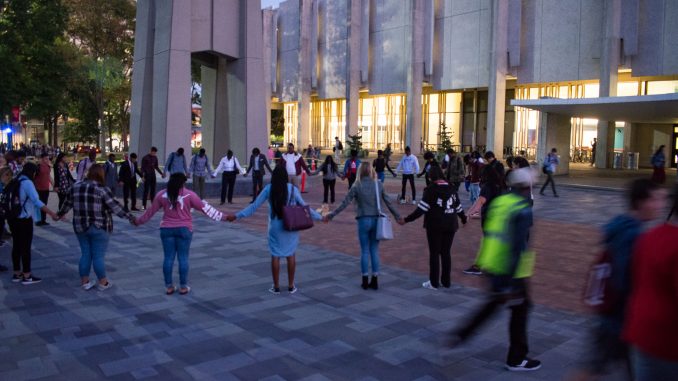
The morning after a shooting in Las Vegas, William Ciancaglini didn’t recognize the city.
The 2003 Beasley School of Law alumnus was vacationing at the Monte Carlo Resort and Casino, blocks away from the Mandalay Bay Resort and Casino where a shooter opened fire on a crowd at an outdoor country music festival on Oct. 1, killing nearly 60 people and injuring more than 500 others.
The Temple community, nearly 2,500 miles away, felt the impact of what is now known as the largest mass shooting in modern United States history.
While walking on the Las Vegas Strip that night, Ciancaglini saw a small group of people running toward him followed by a larger crowd of hundreds, all screaming and waving to run the opposite direction.
“I heard the gunfire and people were yelling, ‘There’s a shooter,’ but nobody could tell where the shots were coming from,” Ciancaglini said. “People were being shoved into the streets, but the cars weren’t stopping and everyone was in a complete panic.”
He said the next morning, the people who drank, ate and laughed were gone. Instead, he saw the aftermath of tragedy.
When he heard the news about the Las Vegas shooting, adjunct journalism professor Saleem Ahmed remembered what happened on Dec. 14, 2012.
On the day of the Sandy Hook Elementary School shooting, Ahmed lived in Brookfield, Connecticut, only 10 minutes from where 20 children and six adults were fatally shot in their classrooms.
“That hit very close to home,” Ahmed said. “I remember walking down the streets in the cold and witnessing how that event affected the families around me.”
Ahmed said it was difficult to digest the pain around him nearly five years ago. Today, he said he could only imagine the trauma that the victims of the Las Vegas shooting and their families must be facing.
“We need to disregard the statistics and before we talk politics, we need to consider the human element of this tragedy,” Ahmed said. “Many of us have become desensitized to these events, and tragedies such as these should not be easy to read about.”
In Philadelphia, Jack Kanter, a sophomore finance and real estate major and Las Vegas native, woke up to messages from his friends who were at the concert.
After confirming that his parents, family and friends were safe, Kanter said he listened to his friends describe what happened. He said one of his friends watched someone get shot only feet away, while another said the most difficult part was stepping over dead bodies in an effort to escape.
“I was more shocked than anything and then I was just devastated,” Kanter said. “My mom said she hadn’t seen anything like that since 9/11.”
Other students from Las Vegas, like second-year graduate podiatry student Ankita Shete and Mitchell Diesko, a third-year Beasley School of Law student, were awoken by similar messages. They couldn’t sleep until they knew their families and friends were safe, they said.
“This really scared me and I was up for most of the night after I heard,” Shete said. “This needs to stop being part of our country’s narrative.”
Shete said her aunt and uncle are both physicians at the University Medical Center of Southern Nevada and were working nonstop to help people who were shot or injured as they ran from the concert venue.
“You see Sandy Hook, you see Orlando, but this isn’t supposed to happen to the place I call home,” Diesko said. “No one I knew was killed but so many knew someone who was. That could have very well been my sister who loves country music.”
According to the New York Times, people in Las Vegas waited up to six hours at blood drives. Many organizations have had to turn down donated items like food or blankets because they have too much.
“Although Vegas was hurt, it is incredible to see people come together to help one another,” Diesko said.
For the rest of the country, however, Ahmed said it is oftentimes all too easy to offer prayers and move on.
“I wish each person could physically go to a community that has been affected by a mass shooting and look into the eyes of someone who has lost a family member,” Ahmed said. “Then I think there would be a greater effort to prevent something like this from ever happening again.”


Be the first to comment